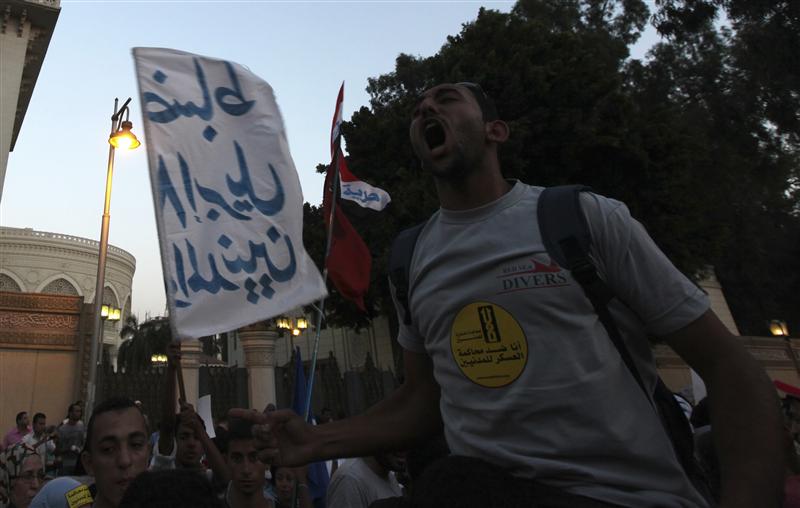Latest NEWS
- Aswat Masriya, the last word
- Roundup of Egypt's press headlines on March 15, 2017
- Roundup of Egypt's press headlines on March 14, 2017
- Former Egyptian President Hosni Mubarak to be released: lawyer
- Roundup of Egypt's press headlines on March 13, 2017
- Egypt's capital set to grow by half a million in 2017
- Egypt's wheat reserves to double with start of harvest -supply min
- Roundup of Egypt's press headlines on March 12, 2017
HRW condemns Egypt's expansion of military trials for civilians

Activists chant against military trials for civilians by the presidential palace - Reuters
CAIRO, Nov 17 (Aswat Masriya) – The presidential decree Abdel Fattah al-Sisi issued last month expanding the jurisdiction of military trials "risks militarising the prosecution of protesters and other government opponents," said Human Rights Watch, urging the president to "quickly amend his decree."
The international watchdog condemned the decree in a statement released on Monday, warning that Egypt's military courts "lack even the shaky due process guarantees provided by regular courts."
Sisi issued on October 27 a new law which refers crimes committed against the state's public and "vital" facilities to the military judiciary.
The law, criticised by human rights organisations for expanding the jurisdicition of military tribunals on civilians, was passed shortly after the death of at least 33 security personnel in militant attacks in Sinai on October 24.
The legislation authorises armed forces personnel to cooperate with the police in securing "vital" facilities. It is valid for two years.
“This law represents another nail in the coffin of justice in Egypt,” said Sarah Leah Whitson, HRW Middle East and North Africa director, in the HRW statement. “Its absurdly broad provisions mean that many more civilians who engage in protests can now expect to face trial before uniformed judges subject to the orders of their military superiors.”
The Cairo Criminal Court referred to a military tribunal on Sunday five students at al-Azhar University accused of torching the university's control room, citing its lack of jurisdiction in the case.
The students were charged with joining a "terrorist" organisation, displaying force and threatening to use violence, possession of Molotov cocktails and vandalism in events which date back to January.
HRW warned that Egyptian authorities have already tried more than 11 thousand civilians in military courts since the January 2011 uprising which toppled former President Hosni Mubarak.
Medhat Ghozy, the head of Egypt's Military Judiciary Authority, said in a televised interview on November 1 that the military prosecution has "looked into reports filed against 12 thousand civilians," as opposed to referring the civilians to trial, denying HRW's account.
Since the military ouster of Islamist President Mohamed Mursi in July 2013, which followed mass protests against his rule, 140 adults have been referred to military tribunals, according to an October report by the Cairo Institute for Human Rights Studies (CIHRS).
HRW noted that the October 27 law grants military tribunals "their widest legal authority since the birth of Egypt’s modern republic in 1952."
Upon its issuance, presidential spokesman Alaa Youssef said the new law aims to protect public and "vital" facilities against "terrorist operations". Such facilities include electric power plants and pylons, gas pipelines, oil fields, railroads, roads and bridges, Youssef added.
But the Military Judiciary Authority's Ghozy hinted at a broader use of the new law.
In an interview with private-owned satellite channel CBC on November 1, Ghozy said that the law would be applied to an assault on any "vital" public facility, be it a "university, factory or … electric station."
University campuses have witnessed unprecedented violence throughout the past academic year, with at least 16 students killed amid on-campus confrontations with security forces, according to the Association for Freedom of Thought and Expression's (AFTE) Student Observatory.
The pro- Mursi "Students against the coup" movement has been organising protests against the former president's ouster throughout the past academic year as well as this year. Protests often devolve into clashes with security forces.
Article 204 of Egypt’s 2014 constitution already allows referring civilians to military trials "in cases which represent a direct assault on armed forces institutions, their camps or anything that falls under their authority, alongside assaults on military or border zones, and military institutions, vehicles, weapons, ammunition, documents, secrets, public funds, or factories."
The article was strongly condemned by civil society organisations and a number of political movements before the constitution passed.
No Military Trials for Civilians, a group campaigning against referring civilians to military tribunals, has rallied protests against this article as well as previous legislations which allow the military trial of civilians.
(Writing by Rana Muhammad Taha)










